Introduction by Jim Barnes
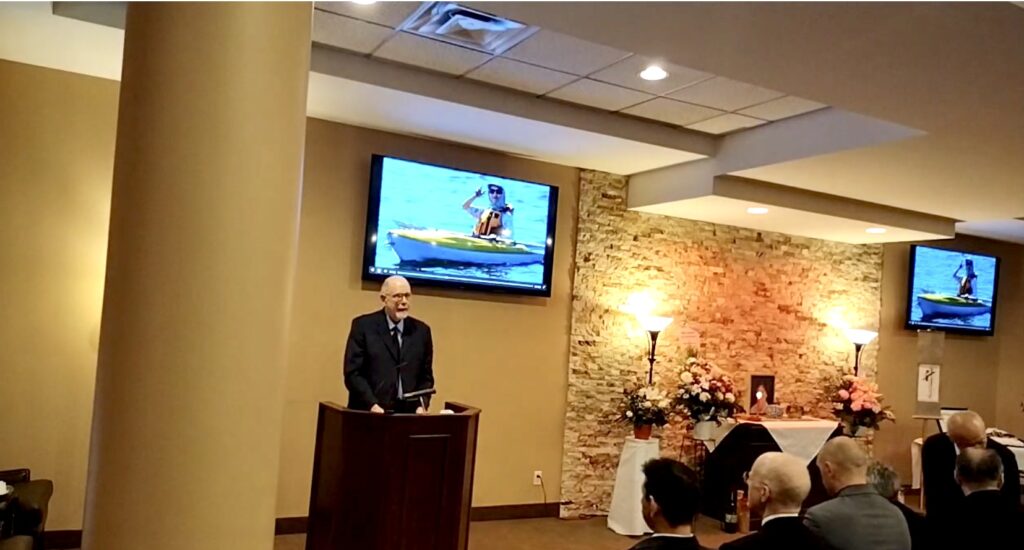
Thank you all for coming, especially the many people who travelled internationally and from across Canada to be here today.
Yumi was the love of my life, my best friend and ally, my sempai, my companion at so many fabulous meals, my co-adventurer in our travels, my colleague, my bedrock. I was so lucky to have her in my life.
I think everyone here was familiar with Yumi’s character.
She was tough and practical, yet kind and generous. You were lucky indeed to have her as a friend.
And she cared so deeply about her friends, it was funny sometimes. People would come to her to talk about the problems in their lives. Maybe some of them just wanted a shoulder to cry on.
But they had no idea what a powerful force they were unleashing. Yumi would not rest until she had solved those problems. If she couldn’t find the answer herself, she would call on her huge network of friends for the answer. Very shortly, she would come to you with her solution. If you had thought she had forgotten about you, you were mistaken.
That attitude was core to her. She was utterly sincere and practical.
A lot of people see misfortune, poverty or bad news from around the world, and they feel sympathetic and moved. Yumi went beyond that.
When she saw homelessness, she donated to the Daily Bread Food bank and other local charities. International problems spurred her donations to UNICEF and Doctors without Borders, among other groups. She never bemoaned her illness, but instead regularly donated to fight disease through research – not just cancer, but dozens of causes and organisations. Her sympathy ran deep.
She went into everything she saw as worthwhile with passion and made lifelong friends in the process.
Yumi was a giant in Canadian Aikido and established close relationships across the country, not just with senior instructors, but with the junior ranks. She was known and respected internationally. Some of our guests will be talking about this.
I want to say this about her love for Aikido. People with her illness are gradually forced to give up the things they love when they can’t manage them anymore. Yumi slowly had to withdraw from everything – playing the piano, calligraphy, visits to friends and travel, restaurant visits, even going for walks in the park.
But she never withdrew from Aikido, even in the last days when she could no longer get on the mat.
She was utterly determined to attend the seminar in December in Toronto, which she kept saying was going to be her “last”seminar.
No matter what, she was going to be there in her gi, chatting with old friends, watching her student Vlad take a black belt test and making sure that the new beginners from both dojos were doing well on the mat.
But even her immense willpower was not sufficient. That seminar became a memorial event.
Friends from every aspect of her life are here.
The first speaker I’d like to introduce is Hayato Osawa-shihan from Tokyo, Japan. He is a leading international master of Aikido and the technical director of the Canadian Aikido Federation.
Yumi worked tirelessly with him to facilitate his visits to Canada and ensure that he enjoyed them while he was here. Over the course of the years, they developed a warm relationship. Sensei travelled all the way from Japan just to be here with us today. I can’t tell you how deeply honoured I am by that.
Sensei:
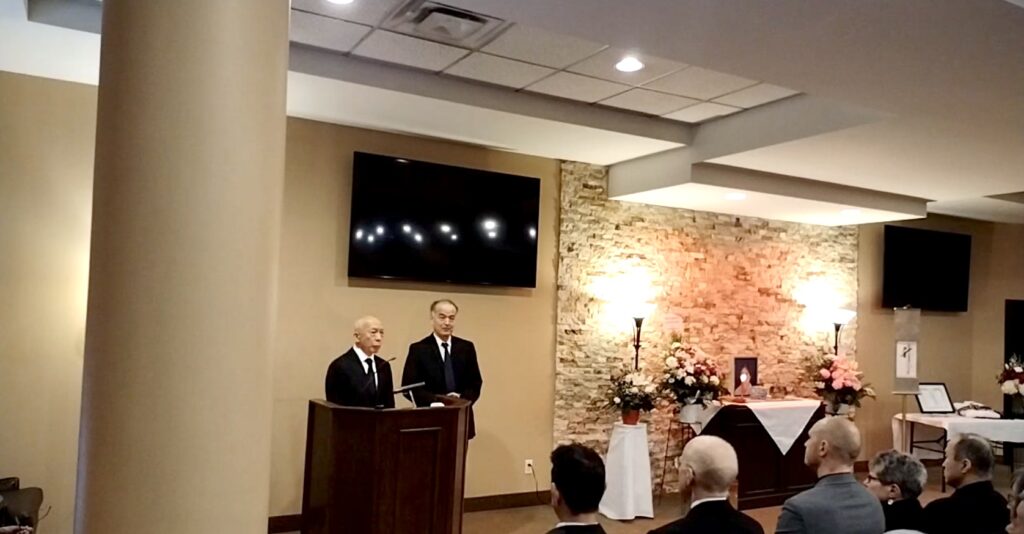
Hayato Osawa, 8th dan shihan, Technical Director, CAF
(Translation by Kenji Yoshimi)
I had been worried since I got a phone call from Yumi-san early in December. She was hospitalised.
She has looked after me very well. When Yumi-san was there, I had fun teaching and practising. I felt there was a connection between us.
The relationship with Yumi-san started in 2011 around July, after Kawahara-sensei passed away, She started calling me to ask me to come and teach in Toronto.
I’ve been teaching in Canada for 10 years and more. I have been able to do that because of Yumi-san.
Yumi-san has a strong will, is gentle and has a warm heart.
I have asked her many questions. Sometimes, she said “Slow down, Sensei, take your time. Let’s do it slowly.”Yumi-san gave me that good advice.
I asked her what to do about my relationship with the CAF for the future.
During the phone call on December 2, her last words were “Please keep on looking after us, from now on, too.”
I just said, “Yes.” I would like to continue teaching the CAF.
Thank you, Sensei. The Canadian Aikido Federation Examination Committee was a very important group for Yumi. She was devoted to preserving the very highest technical standards in Aikido, and supported this organisation without reservation since its beginnings.
Any of our colleagues on the committee would have been pleased to talk about the influence Yumi had on our work. I’ve asked Ishu Ishiyama to speak, since he knew her the longest, dating back to their early days at Osaka Aikikai in Japan. Ishiyama sensei:
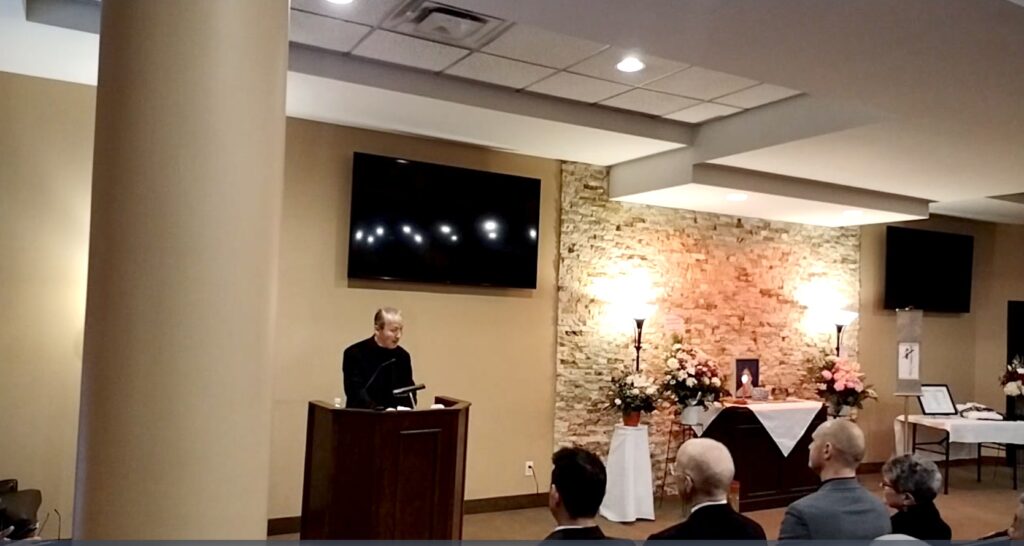
Ishu Ishiyama, 7th dan shihan, CAF Examination Committee member and chief instructor, Vancouver West Aikikai.
Thanks for giving me an opportunity to say a few words in remembering our friend and colleague, Yumi Nakamura, a seventh dan Aikido shihan for the Canadian Aikido Federation. I have known Nakamura sensei for over three decades.
We worked closely as members of the Examination Committee of the CAF for the past ten plus years. Originally we are from Japan, so we often spoke with each other in Japanese. We also had a personal connection with the late Kawahara shihan, the first technical director of the CAF.
She was one of Kawahara sensei’s favorite and most trusted students and he always looked forward to seeing Yumi and her husband, Jim, in Toronto.
As a member of the CAF Examination Committee, Nakamura sensei played a key role in conducting black belt exams, discussing the results as well as in reviewing our policies, procedures and technical standards. She also served as our liaison person with Osawa shihan, the current technical director, for over ten years.
Many of you remember a loud, strong voice coming from a tiny woman, giving instructions during exams. She was straightforward and yet warmly caring for each test candidate.
At the adjudication meetings, I was always impressed with her ability to recall the details of our past discussions from years back. I used to say to myself, “How does she remember all these things?” Nakamura sensei was indeed the kingpin, or let me say, “queenpin,” who kept our committee going smoothly and productively for years.
As the Examination Committee, we are deeply indebted to her truly dedicated service. A few weeks before her passing we chatted over the phone about our health and aging challenges, in which she stated her preference to follow the natural course of dying without artificial, medical interventions to keep her alive. It was not a dramatic, emotional statement.
She sounded calm and factual as if she was ordering her meal at a restaurant. As we all know. Yumi sensei lived and enjoyed her life fully. She was surrounded by her beloved husband and her friends and students across the country.
She accepted and embraced the termination of her life, without fighting or resisting it. She showed us gracefully and graciously how one can be at peace with one’s declining health and the imminence of death as a natural, inevitable process, with a smile.
Nakamura sensei has been a wonderful gift to us and the Canadian Aikido community. She was a person of integrity. She was an inspiring Aikido teacher and practitioner until her last moment.
One of her parting gifts is to offer a memorable opportunity for us to come together today, in person and online, to celebrate her life and share our stories and feelings with each other. Thank you. Yumi san, for your inspiring way of being, doing and living as an individual. Although we will miss seeing you on the mat and in our gatherings, we, the Canadian Aikido community, will remember you fondly, with deep respect and appreciation, and we will continue to feel your presence. In our heart.
Thank you, Jim-san, for coordinating this special event with so much attention to the detail, in spite of your intense sorrow and grief over the loss of your beloved wife and life partner.
Thank you, everybody.
Thank you Sensei.
Next, I’d like to ask Steve Erickson from Calgary to say a few words. Steve is the current president of the Canadian Aikido Federation, but his relationship with Yumi is a deep one that goes back a very long way. She has been teaching seminars at his dojo in Calgary for many years, and Steve has often told me about the huge impact her teaching, support and warmth had on his members. Steve:
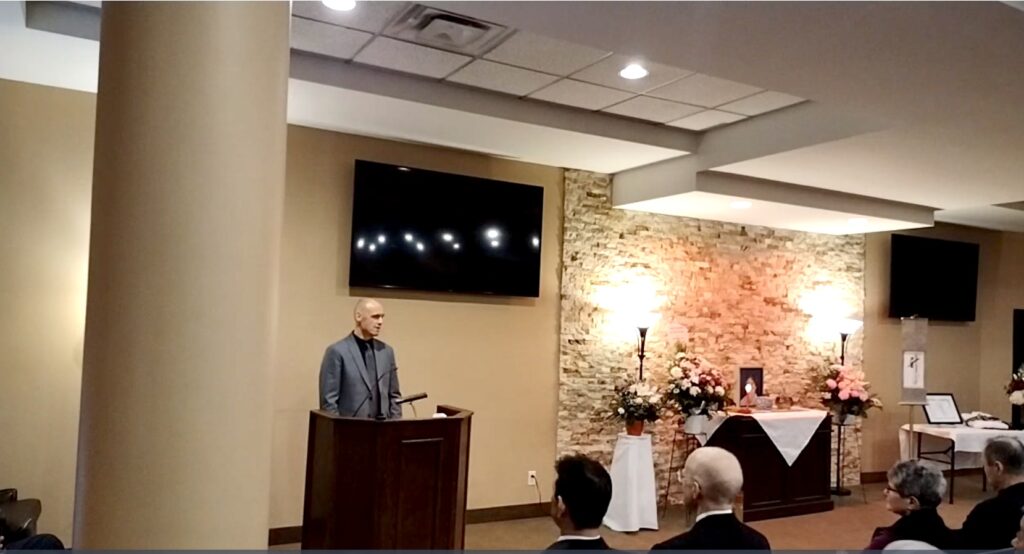
Steve Erickson, 6th dan shidoin, CAF President, chief instructor, BigRock Aikikai
Thank you. I am so incredibly honored to be standing here today speaking about Yumi Sensei. I consider myself very fortunate to have had the opportunity to be close to her and experience her love and her wisdom.
In the context of our Canadian Aikido community. As Jim Sensei said, I’m currently president. And that puts me in a position where my decisions affect a lot of people. I’m very grateful to Yumi sensei for helping to guide some of my decisions.
As a dojo operator, she has been completely integral to my life.
When Kawahara sensei passed, I found myself quite lost and directionless. In those days emerged a small group of exceptional individuals who would carry us while we developed an enduring relationship with Osawa sensei.
For me, Yumi sensei was at the front of that group. She helped to remind me of the value of what we were doing and that what I was doing, personally, still had value.
She first visited my dojo in 2012, a year after Kawahara-sensei passed, and she continued to visit each year until 2024. Over all those years, she cultivated a special relationship with many of my young people.
And when my young girls took black bell tests this fall in past I could see her lessons in them. Not subtle, but tangible and meaningful. I think it’s lessons like hers, powerful lessons, that deserve to be passed down generation to generation.
We will always remember you.
Thanks, Steve. I’d like to talk a bit about Aikido Tendokai. That dojo was the culmination of a lifelong dream and hard work.
The name of the dojo, “Tendokai,” captured her vision completely. “Ten” means heaven, “Do” means way, and “Kai” means association: it’s “the way of heaven.”
I’d like to ask Rob Carroll to say a few words. Rob is Yumi‘s longest-standing student and also her successor as leader of Aikido Tendokai. Rob:
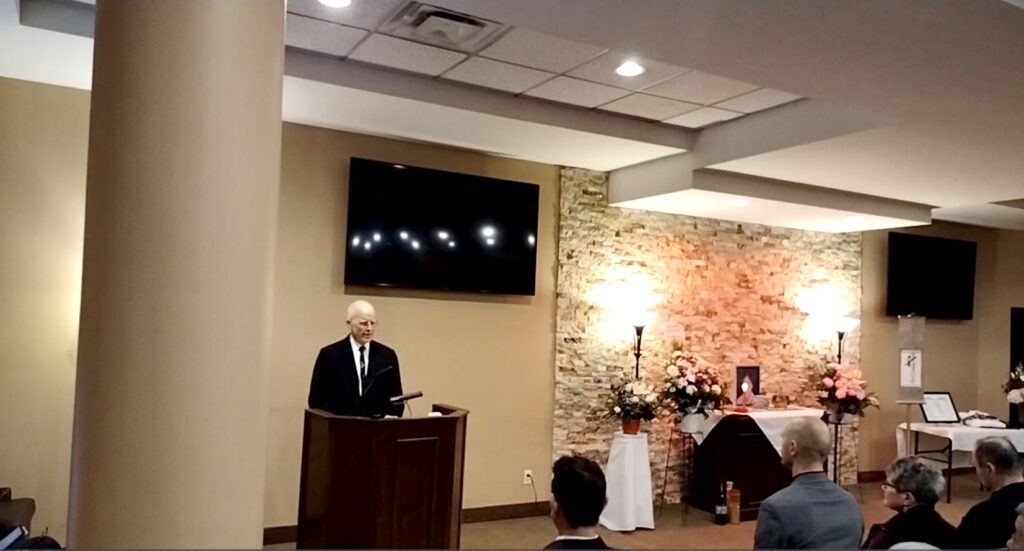
Rob Carroll, 6th dan shidoin, chief instructor, Aikido Tendokai
Thank you, Jim. First of all, I’d like to thank everyone for coming. It’s nice to see so many people from the Aikido community, many of you that I’ve known for years, and other connected friends.
I’d like to start by saying I met Yumi in 1983 when I joined Toronto Aikikai and ever since then, she’s been a constant presence in Aikido. She’s been at every major seminar, every event, and many classes just in the dojos.
In the early seminars, often she would be the translator for visiting instructors. So most of you that are connected to Aikido would be very familiar with her role. I’m here to mostly talk about Aikido Tendokai.
Tendokai started in 1992. It was a small group of people formerly from Toronto Aikikai who supported Yumi in her idea to form a new dojo. At the very beginning, our classes were held in a community center, sharing the space with other users, as is typical. We used the center’s wrestling mats. The mats would have to be put out before each class and put away after every class. We stayed there for a number of years.
Later, we moved to University Settlement, another community center. But at least there, we had a room that was pretty much devoted to us. We were able to install permanent mats. It was a good environment for a long time.
But eventually we had to leave that space also. And in 2010, we were able to move to our current location in the building that many of you know that’s on Dundas at Ontario Street.
From the very beginning, the dojo has been a group effort by many people. But by far it was Yumi’s personal effort and determination to form the dojo, following her vision of what Aikido could be and what the dojo could be like as an environment, that was the defining aspect of Tendokai, I think.
She definitely wanted to develop a space where the practice was authentic, but where all participants were treated with respect regardless of their level of practice or their level of experience,
The dojo could be a strict environment but it could never be an intimidating environment. An environment where practice could be a positive force in people’s lives. Over the years, Yumi remained deeply committed to Tendokai and all its members, forming relationships that went far beyond just practicing together on the mat.
With Jim, she hosted many summer barbecues, winter Christmas parties, celebrated birthdays, sent gifts for new babies and condolences on the loss of parents or family members.
She was extremely protective of new students, and for many years she taught all the beginners’ classes and most of the kids’ classes.
Yumi maintained a close working relationship with Kawahara-sensei, the first technical director of f the CAF, and continued that support with the current technical director, Osawa-sensei.
She made sure that the dojo always followed this direction and encouraged all students to attend major seminars and summer camps so they could experience a little of practice beyond the scope of the dojo.
Tendokai has grown in membership over its 32 year history. Even with students and former students moving away, many remain in touch. Many of you are here today. The people that remain in touch continue to participate in the community Yumi was trying to develop. The dojo was for her a sacred space.
I’m hopeful that we can continue to build on that tradition that she committed to. Thanks very much.
Thanks, Rob. I’d like to speak about Yumi and Aikido Hokuryukai. She cofounded that dojo with me more than 30 years ago.
The students at Hokuryukai too, were dear to her heart and trained under her watchful eye.
There were several members I could have asked to speak about Yumi from the dojo.
I asked Vadim Katcherovski, one of our associate instructors, because he was also a frequent travelling companion and good friend, and Yumi met and became quite fond of his family.
We often travelled to seminars together. I can’t tell you how much Yumi enjoyed taking him with us to Japan on a tour, as well as the trip he organized for us to his homeland, Belarus.
I think her relationship with Vadim is representative of many friendships in Aikido that transcend the dojo to become part of one’s personal life.
Vadim:
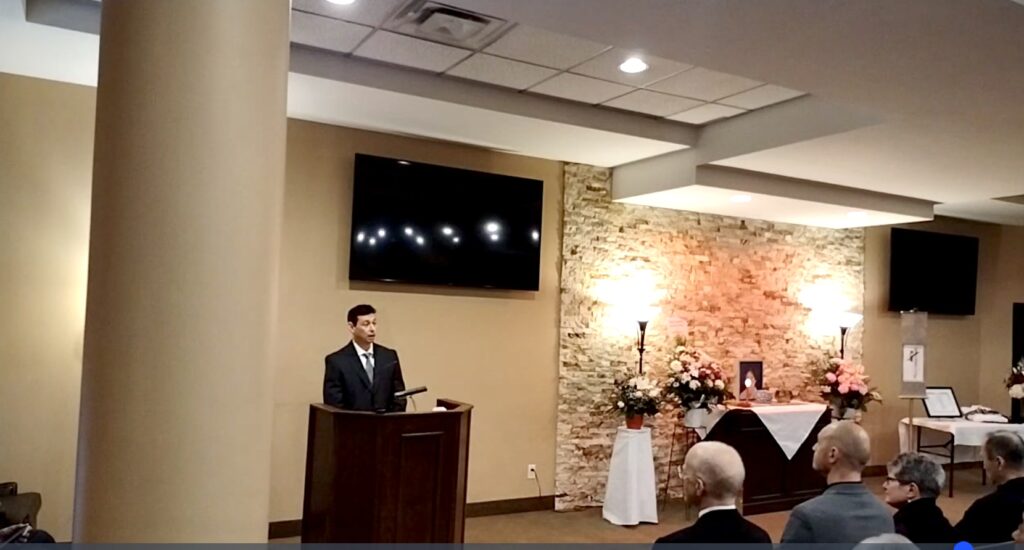
Vadim Katcherovski, 3d dan, associate instructor, Aikido Hokuryukai
Thank you Sensei, I’m very honored to be speaking.
I remember my first Aikido class. I didn’t participate, I came to watch. And I knew by the end of the class that I was going to join.
Yumi was teaching that class. Of course, I don’t remember any of the techniques that were taught. What stuck with me was the way the class was taught. Then and there, I knew that I found my teacher and I found my dojo.
Everyone at the Hokuryukai dojo, including myself, was privileged to have Yumi-sensei as one of our instructors.
Yumi was a remarkable person, who was the kindest person you could ever meet and also be very demanding. She would be infinitely patient with you when you were learning a new technique, and she would quickly lose her temper and be frustrated if you specifically chose not to listen.
Teaching students in the dojo was her true calling. She cared deeply about every student in the dojo, and as Rob mentioned, especially the beginners. She would ensure that they practiced safely and would always encourage even the tiniest bit of progress. Trust me, I speak from experience.
She had an exceptional way of pointing out errors in a way that you would be encouraged to never repeat them. Trust me, I know of what I speak.
Some of you know this story. Yumi sensei was teaching a class when I was a junior white belt, demonstrating one technique after another. I was completely lost, unsure what was happening and what to do. That still happens a lot!
Yumi sensei stopped beside me and watched me for a few minutes. Finally she said, “Vadim, you have such a good memory. You’re still doing the previous technique.”
She wanted everyone to share the joy of training. After practice, you’d be tired, exhausted. But you would always be happy.
And I know I speak for everyone. I was always looking forward to her classes and her teaching. Yumi sensei had an unbendable will and unbreakable spirit. And even in her last days, she would joke and smile and she had absolutely no fear about the next stage.
She was a mentor, she was an inspiration, a motivation for several generations of Aikidoka. Her influence shaped so many of us, guiding us not only in the dojo, but also in life. Yumi sensei, your memory and spirit and teachings will always be in our hearts and in our minds.
Thanks, Vadim. Our next speaker, Pat Olson is another very prominent figure in the Canadian Aikido community. However, I asked her to talk more about her friendship with Yumi. Many years ago, when they met at a seminar, they bonded practically on sight and have remained the best of friends ever since.
They have enjoyed each other’s company at seminars, when travelling and during many visits to Pat’s beautiful mountain cabin in Kelowna and in tours of the Okanagan Valley. Pat:
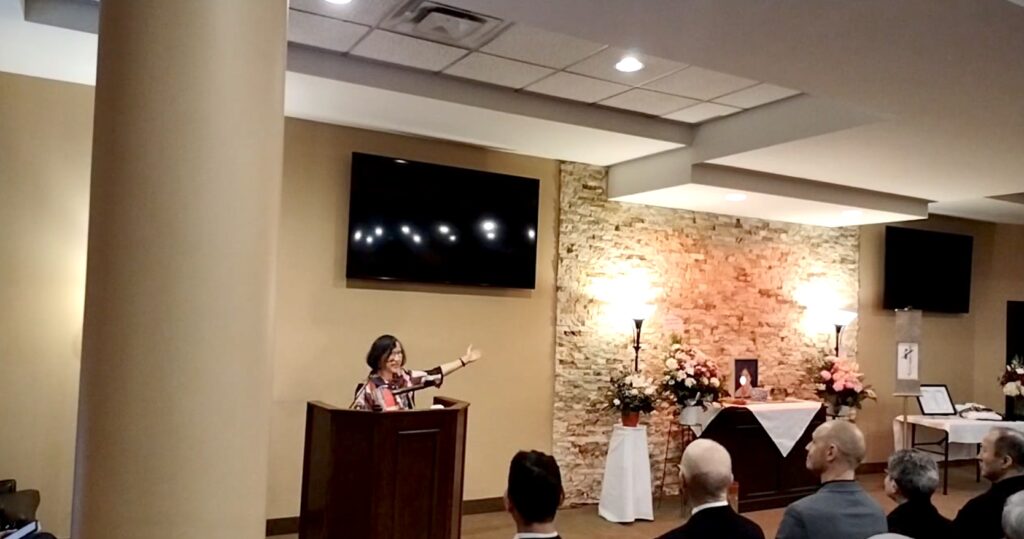
Pat Olson, 6th dan shihan and close personal friend
Thank you, Jim. It’s so good to see all of you here. And my condolences, especially to Tendokai, Hokuryukai and Jim.
Osawa-sensei asked me, what is your relationship with Yumi-san? Teacher or friend? I said, “Both.”
Now, because I’m speaking as a friend I will just refer to her as Yumi. Always Yumi-sensei in the dojo, however.
I met her at the 1991 summer camp when Waka-sensei came to teach.
I met most of you there, from across Canada. Steve Erickson was a teenager. And in 2008. I met Osawa-sensei. The camp experience is really very positive. I hope most of you can continue to come and learn from Osawa-sensei’s camps and seminars.
I lived in a lakeside cabin in British Columbia and Yumi and Jim would visit. Yumi was a water baby, she loved the water. I know other people are going to talk about her kayaking. Yumi was teaching me to snorkel in the Bahamas, and so we know that she loves the water.
She’s good at it. I’m scared of the water. She told the snorkeling teacher to take special care of Pat. She’s a little bit scared of the water.
And she loved to walk. She would walk around the mountain trails in BC with us.
And we often visited the interior of BC. We visited the internment camps from the Second World War. The place I would recommend is New Denver. There’s a museum. The original residents built these little 600 square foot bungalows, and two families shared the bungalow. So it would be one half with one family, the other half another family.
The skill of those carpenters! Those bungalows are still there since the 1940s. And they are all designed differently. I just wanted to talk about this. I promised Jim that I won’t cry because we’re going to talk about hope and joy. Because even though it was the worst circumstance. These Japanese residents were able to make a beautiful place in the Kootenees in the mountains of British Columbia.
About her calligraphy. Of course Yumi won an award, and it’s more important to her than her 7th dan. Because I like children. I like to bring props, so I brought a prop. Yumi gave this to me. And here’s another one.
Chinese New Year is coming up soon. So Chinese people are a little bit superstitious. This one means good fortune. So you see this character all over.
I’m talking as a friend, but still, we have other friends in Aikido. And I promise to give this to my fellow younger brother, Ivan. I said, I have two pieces of Yumi’s calligraphy and I will share one with you.
I’m sharing this one with Ivan because it’s “ki.” One day, Ivan will be a shihan, so he will remember Yumi.
When Yumi came to my house, she played the piano. She decided to learn how to play the piano in her 60s, and she had an app on her tablet that taught her how to play. She was able to play Beethoven’s Ode to Joy, and in her last year, she was learning to play — I have to read this from my notes — a Japanese composer. His name is Nobuyuki Tsujii, a blind composer. He composed Elegy for the Victims of the Earthquake and Tsunami. That was in 2011, when Kawahara sensei had died and Osawa sensei came.
This elegy is very, very beautiful. I recommend everybody to listen to it, because with Aikido we look at movement, but with music you can hear, you can feel the movement. Nobuyuki composed this in A minor, a minor key, which is very somber. And a little bit sad, wondering, “Why is this earthquake happening to us?” And it ends with A major, triumphant and hopeful and joyful sounds, so please look up “Blind pianist playing elegy for the earthquake and tsunami.”As Yumi’s final words to Osawa sensei were, I feel very hopeful that we’re still being looked after.
Thank you, senseis. Thank you, Jim.
Thanks, Pat. Many of her students remember how Yumi would disappear for a few days during the summer, later to hear about this beautiful cottage up north where she would relax and go kayaking.
Our next speakers, Doug Burn and Ingrid Eilbracht, have nothing to do with Aikido but were among Yumi’s very best friends, hosting us in Muskoka and regularly joining us for entertainment and meals in Toronto, or sometimes just going for a walk in High Park. Two of my favourite people, Ingrid and Doug:
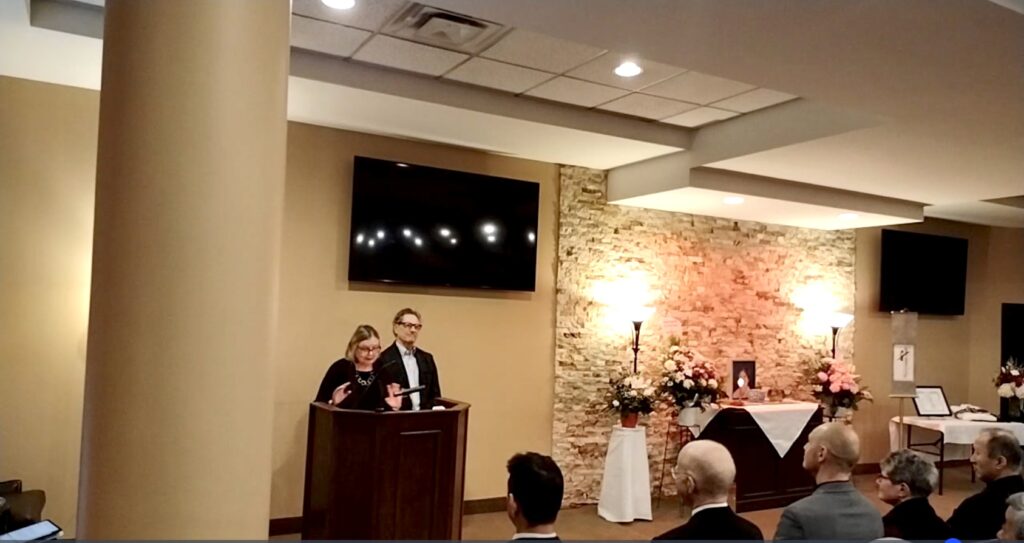
Ingrid Eilbracht
Thank you, Jim. It’s an incredible honor to have known Yumi She was a gift to all of us. And it’s an incredible honor to talk about her with you.
I first met Yumi after I retired in 2013. Jim and I had been colleagues at work for many years, and when at length I was able to retire, and to enjoy spending entire summers at our cottage on Georgian Bay near Parry Sound.
Doug and I decided to invite them to visit with us. They became regular and frequent visitors over the years, and we became close and good friends. Right from the start. I knew Yumi was a special person.
For one thing, she was always very patient. For example, she never complained about our partying out on the deck. She would sit in a rocking chair or in the chaise lounge facing the water and I suspect she was laughing to herself as Doug, Jim and I drank many beers and sang along very loudly and very badly to our favorite rock and roll tunes from the 50s, 60s and 70s. She never complained.
But she wasn’t just patient. She was kind and helpful. She was so grounded and practical. She didn’t just play lip service. She knew how to walk the walk.
For example our cottage is old. It’s built of wood. It sits on rock with the bay less than, say, 60 ft away. It’s very close to the water. It’s whipped by wind by rain in the winter, by snow and ice, which just blasts the building, and that means every year we have to paint and stain it. It’s a lot of work.
Well, one year we were complaining about having to do this job and Yumi Immediately offered to help. Offered to help! “Jim and I can help you,”she said, and they did. It made the work a joyful experience rather than a hard one. And, — I want to point out — none of our other friends offered to help. Neither did our families. But Jim and Yumi immediately helped. Her cheerful, her practical and her kind efforts on our behalf will be missed. I hope you’ll be doing double the work, Jim.
Another example of her kind and practical nature… My mother lived with us during the summer months. She died two years ago at age 97. And as my mom got older and older, her arthritis became increasingly painful and debilitating.
What did Yumi do? She gave my mother — unasked — wonderful and strenuous deep leg massages so my mother could drift off to a more restful sleep. Of course, my mother adored Yumi and really looked forward to her visits.
And even when Yumi herself began to be increasingly fatigued and weak from her cancer treatments, she continued to offer my mother the gift of her healing touch.
Yumi understood the importance of living in the moment. Once again, she was totally grounded. Simple things like going for a walk — we would be walking forward on a path and then all of a sudden, she’d turn around and walk backwards in the same direction, smiling and laughing. Moving quickly, sure footed, no hesitation. One step after another backwards, as if she had eyes in the back of her head.
She knew how to squeeze every drop of joy in being. Just being. In the midst of pain and declining strength, she never complained.
She insisted on positivity and goodwill. Negativity was simply not tolerated.
I will tell of a wonderful memory of her second to last summer visit with us. Doug and I were out in the canoe together, and Yumi was out in her kayak.
And it was one of those clear blue days. It was blue sky, blue water, no clouds, bright sun sparkling everywhere on the rocks, the water, the trees. And it was quiet.
In our canoe we started to come alongside her kayak when I heard her singing,
softly and quietly to herself as she glided along the water. It was magical — much like Yumi.
Her friendship was a gift. So thank you, Yumi, for being my friend.
May your beautiful soul always be singing with the angels.
Doug Burn
Thank you. I don’t have much to add.
I don’t remember much from Sunday school, but I remember the advice to do unto others what you would have them do unto you. And this became most apparent when Ingrid and I joined Jim and Yumi last January for a short vacation in Cuba.
It seemed that Yumi knew all of the staff at the Paradisus Rio de Oro resort in Guardalavaca from their previous visits and they certainly seemed to know her. She knew them because she had made it a point to get to know them, to ask about and sympathize with their lives, their aspirations and their problems. One day Yumi was delayed in joining us for breakfast in the main dining room, and everyone, from the maître d’ to the serving staff to the omelet chef, were concerned enough to ask, “Yumi, esta bien?”
I remember the nightly floor shows and the resort’s nightclub, the house band and visiting musicians. Dancers always try to engage with their audiences to get them up out of their seats and join in the singing and the dancing. They had no better friend than Yumi. She would be the first to join in the festivities and would enthusiastically encourage others to do the same — going so far as to ask those who were sitting alone to get up and dance with her.
I can think of no better compliment than say of another that he or she inspired me to be a better person, and I can sincerely say that of Yumi. I can think of no finer tribute to Yumi than to follow her example.
Thank you.
In some cases some people couldn’t be here or were reluctant to speak in public so I’ll do my best to represent them.
Shodo, or Japanese calligraphy, enabled Yumi to express her artistic side.
As one of her Shodo classmates, Kathy Tamaki, explains, Shodo is a spiritual and artistic discipline that is a traditional part of Japanese culture today.
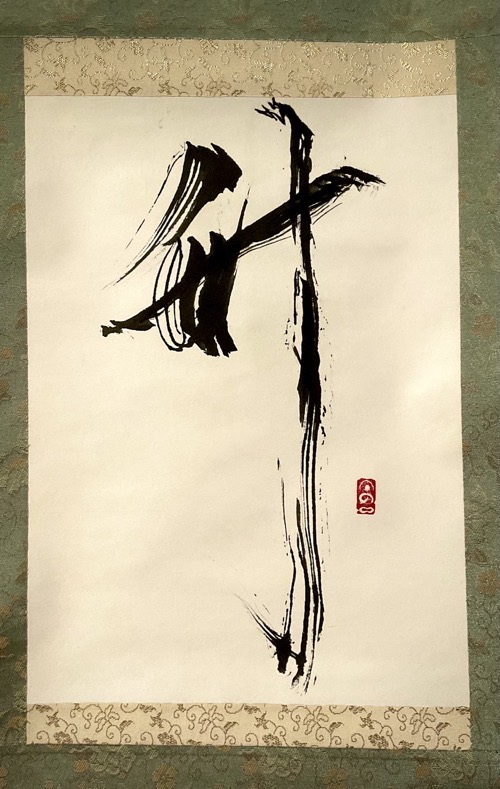
Message from Kathy Tamaki, calligraphy
“Yumi loved Shodo. She attended classes at the Japanese Canadian Cultural Centre for many years. Covid was no match for her commitment to the art, and Zoom quickly became the platform for her participation.
To no one’s surprise, Yumi became very accomplished at Shodo. She earned a coveted Gold Award in the 2022 Japanese Calligraphy Competition in Canada.
(The award and the prize-winning scroll are exhibited here.)
“Our teacher, Noriko Maeda-sensei, remembers Yumi for her perseverance and wonderful, positive attitude.
We were all inspired by Yumi’s hard work and enthusiasm. And Yumi always had kind words of encouragement for her classmates.
We will always remember her beautiful, infectious smile, and how much fun she was having. We were so fortunate to have her in our class. She will be greatly missed.”
Yumi was a world traveller and like nothing better than touring new places.
Cuba, however, was the place she returned to for some 30 years, seldom missing a year and sometimes going twice.
When we started going to what became our favourite resort near Guardalavaca, we met Jennifer Hardy.
Unfortunately, it is the season for viruses now and Jennifer told me yesterday that she was too sick to attend. She asked me to read the remarks she prepared.
Message from Jennifer Hardy
“I met Yumi and Jim over 10 years ago when the three of us arrived at a Cuban resort on the same evening. I always traveled alone, because, frankly, I found it too exhausting to travel with others.
In Yumi and Jim – I found my people. At the orientation session, Yumi and I decided we’d both like to go on a catamaran trip and decided to do it together. That was the beginning of a beautiful friendship that was incredibly important to me.
We bonded on that trip. I joined them for dinner and the show every night, which gradually led to occasional breakfasts, lunches, and spa visits. And we started a tradition. I’d schedule my vacations around the times the two of them were heading to Cuba. I finally found people that I could travel with!
Back in Toronto, our friendship grew to include dinners at Allen’s and Greek, Korean, and Cuban restaurants.
Yumi was my hero. Her joy in life, her extraordinary empathy, and her awesome sense of humour will forever inspire me.
And she was fearless. I remember a conversation she and I had on the beach one day a few years into her diagnosis. I asked if she was scared. She responded “no,” with absolute conviction.
She believed there was something more after life and looked at it as a grand adventure. True to her nature, the only worry she had was for Jim. She didn’t want him to be lonely.
Yumi taught me so much. She taught me about forest bathing, and the best way to attract fish when snorkeling, and she always knew which restaurant was serving lobster on any particular day.
She introduced me to the philosophy of Aikido. She was always happy to dole out insect repellant and fix my mask and snorkel for me, and we shared an intense love for Cuban music. The staff at our resort would simply light up when they saw her. To know Yumi was to love her.
I am so grateful and privileged to have had her in my life. Her grace and strength in the face of adversity were such an inspiration and my world is that much emptier without her. Yumi gave me strict instructions to continue travels and friendship with Jim and I know wherever we are, she’ll be right there with us.”
Some of her friends from her work are here, too.
Yumi was very well-respected as an X-ray technologist. She told me a bit about her background – she had graduated from one of the most prestigious radiological institutes, located in Kyoto, Japan. She told me that their lectures were sometimes delivered by Nobel prize-winning physicists.
I found a reference to a major international radiological publication in which she had published a paper. She never mentioned that to me. I know that what was important to her in her career was helping and interacting with people. That was what was important to her – human contact.
I remember how I would come home to hear her talk about her workday with the staff at Toronto Rehabilitation Institute. That was the highlight of her working career. It was a very tight-knit group, and on the occasions when I joined them at a function, it was clear that they had a deep affection and respect for each other. I’m very happy to see some of them here today.
Yumi was intensely spiritual. She was a devoted student of the teachings of Masaharu Taniguchi-sensei, a visionary who was roughly contemporary with O-Sensei, the founder of Aikido.
She did not have the slightest fear of death, even at the end in palliative care. On her last day, she was still happily greeting visitors to her hospital bed.
I never heard her complain, even though I knew she was in a lot of pain. She never once asked, “Why me?”She simply accepted that it was her destiny. She didn’t see death as the end, but the beginning of a new phase of her spiritual journey. Her only concern was for the friends and family she was leaving behind.
When we joined friends for funerals, Yumi was sometimes asked to speak. Whenever she did, she read a passage written by Taniguchi-sensei in 1931.
She deeply believed every word in it and hoped that it would bring comfort to people mourning the departure of a loved one.
It is a very musical view of the meaning of life and death. I’d like to conclude today with some excerpts from a translation.
Excerpts from a translation of Divine Messages Of Eternal Life, by Masaharu Taniguchi
“Your physical body is a musical composition performed on the strings of thought. The concept that Life dwells in the physical body is a dualistic one and not the truth.
Properly speaking, Life manifests the physical body in accordance with the composition performed on the strings of thought…
All people must someday lose their physical body, but they do not die. Man is a child of God and therefore deathless.
The form of your temporary existence will change according to your thought’s musical score.
When a major change occurs in the form of your thought, your temporary existence will manifest itself in another world and your physical body –– the manifestation of your thoughts until now – will quickly disintegrate.
People call this “death”, but it is not death. It is as if Life has finished the performance of one musical composition on the strings of thought and turned to another.
The initial piece of music will surely come to an end and the performer must study still higher forms of musical composition.
What I mean is that your life on earth must come to an end. Your life on earth is your initial piece.
Do not be sad when completing your piece of music, you will thereby advance to still higher musical compositions.
A musical composition may end, but the performer does not come to an end. The performer is a child of God and deathless!”
Yumi looked at death as another beginning, not an end, and at life as a piece of music.
I’d like to conclude by thanking you all so very much for coming, and thank our speakers for sharing with us.
At this point, I’d like to give people an opportunity to pay their respects to Yumi privately according to your own beliefs. If you would like to do so, please form a single line approaching the front of the room.
You will have an opportunity to place some incense if you wish. When you’re finished, please go to the reception in the Sheppard Lounge for some refreshments. The staff will be happy to direct you.
If you happen to suffer adverse reactions to incense, of course, please feel free to go to the reception room now.